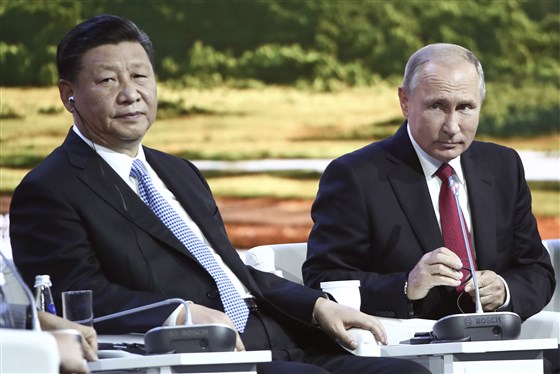World

Mike Pompeo to visit Saudi Arabia over Jamal Khashoggi controversy
US Secretary of State Mike Pompeo is to meet Saudi King Salman amid growing controversy over the fate of Saudi journalist Jamal Khashoggi.
He will then visit Turkey, where Khashoggi was last seen at the Saudi consulate in Istanbul two weeks ago. Turkish officials believe Khashoggi was murdered by Saudi agents but Riyadh has always strongly denied this.
On Monday, President Donald Trump suggested "rogue killers" could be behind Mr Khashoggi's disappearance.
The president provided no evidence to back his comment, but said that during a phone call the Saudi king had firmly denied knowing what had happened to Khashoggi.
Unconfirmed reports in the US media suggest Saudi Arabia is preparing to admit that Mr Khashoggi died as a result of an interrogation that went wrong and that the original intention had been to abduct him.
Meanwhile, Arabic channel Al-Jazeera quotes Turkey's attorney-general's office as saying it has found evidence to back claims that Mr Khashoggi was killed inside the mission.
Earlier, a Turkish security source told the BBC officials had audio and video evidence proving Khashoggi was murdered there.
The issue has strained Saudi Arabia's ties with its closest Western allies. (BBC)
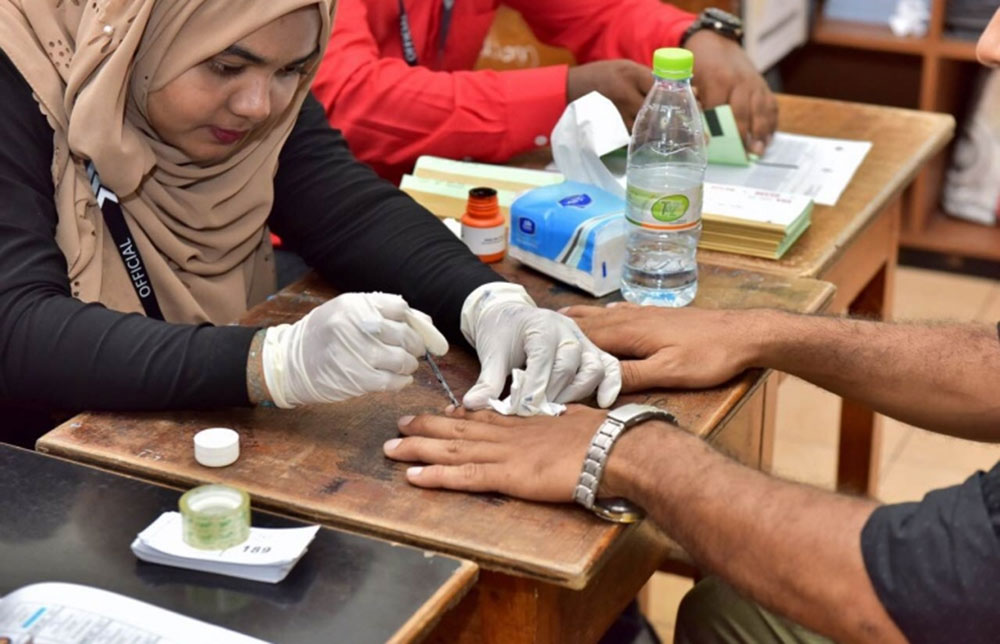
Maldives election: Voting begins in controversial poll
The Maldives has started to vote in a heavily-criticised election that will be closely watched by India and China. The Indian Ocean archipelago is best-known overseas for its clear waters and high-end resorts but its government stands accused of crushing dissent.
President Abdulla Yameen has embraced China, while his opponent, Ibrahim Mohamed Solih, is seen as leaning towards India and the West.The European Union and US have voiced concerns about the election.Both have threatened to impose targeted sanctions if the democratic situation does not improve.
Police raided opposition headquarters on the eve of the vote, according to local reports.Polls opened at 08:00 (03:00 GMT) on Sunday.
The Maldives is made up of 26 coral atolls and 1,192 islands, and tourism is a vital part of its economy. More than 400,000 people live there but its future hangs in the balance due to climate change.
Source : BBC
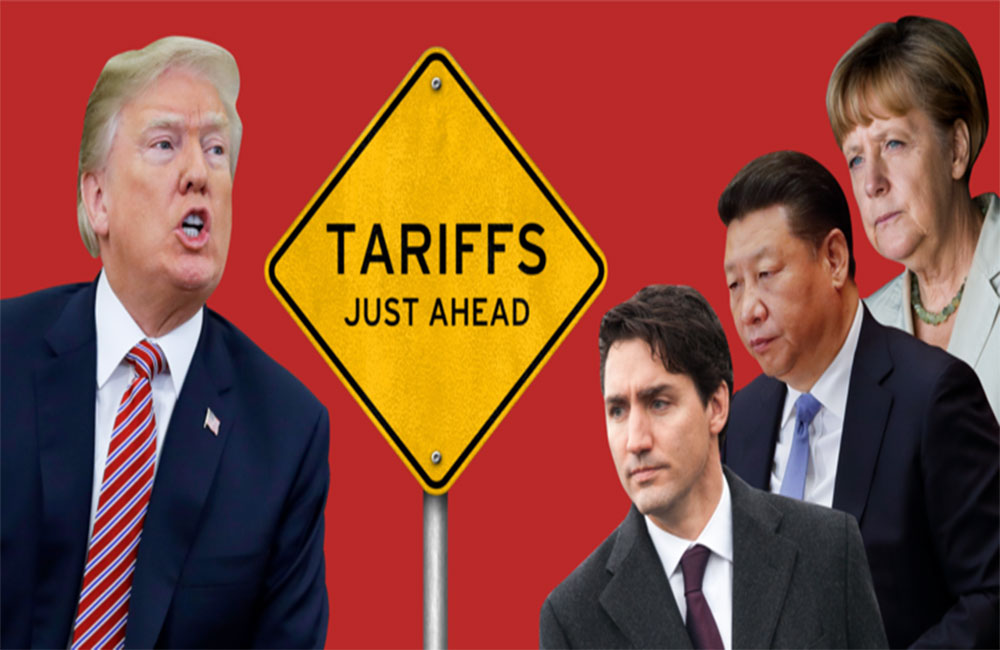
Fed hikes and Trump's trade war have cash flying out of emerging markets
NUSA DUA, Indonesia (Reuters) - After suffering months of capital outflows, policy makers from emerging markets attending IMF-World Bank meetings in Indonesia had a message for leading economies: current monetary and trade policies risk undermining us all.
The International Monetary Fund-World Bank meetings wrapping up on Sunday gave central bankers and finance ministers from around the world a chance to meet face-to-face in Indonesia, whose rupiah currency hit a new 20-year low this week.
Poorer and populous emerging markets have been particularly vulnerable to the escalating U.S.-Sino tariff war and rate rises by the U.S. central bank. Investors dumped assets seen as riskier, sparking painful currency plunges that have punished countries from India to recession-hit South Africa, as well as triggering crises in Turkey and Argentina.
"We are all aware that the normalization of the monetary policy in the U.S., combined with their fiscal policy and trade policy ... are all creating a systemic impact to the whole economy in the world," Indonesian Finance Minister Sri Mulyani Indrawati said in an interview during the meetings in Bali.
The Federal Reserve's nearly three-year-old tightening cycle has in part prompted a global shift in capital away from emerging markets and after three hikes this year, it foresees another December rise, three more next year, and one in 2020.
A senior Fed official in Bali said the rate rises were right for domestic policy and ensuring they were gradual and predictable was "the best solution" for minimizing unintended volatility in emerging markets.
In a bid to support the rupiah, Bank Indonesia has raised rates five times since mid-May and intervened regularly, but still the currency has lost nearly 11 percent this year, leaving it at the weakest levels since the 1998 Asian financial crisis.
Bank Indonesia Governor Perry Warjiyo said that the 150 basis point rate hikes since mid-May aimed to keep Indonesian assets attractive enough for foreigners to stay invested, but calibrating this in the current environment was hard.
"The risk premia are very difficult to incorporate because risk premia are responding to geopolitical, responding to trade tension," Warjiyo told a panel in Bali.
"Spillover" risks
 Locals walk by an exchange office in Buenos Aires, Argentina, Friday, June 29, 2018. According to officials the Argentine Peso devaluated more than 50% to the dollar during 2018. AP Photo/Jorge Saenz
Locals walk by an exchange office in Buenos Aires, Argentina, Friday, June 29, 2018. According to officials the Argentine Peso devaluated more than 50% to the dollar during 2018. AP Photo/Jorge Saenz
Finance ministers for developing nations in the Group of 24 economies urged major economies to reform the global trading system, rather than discard it.
The G24 statement, issued on the sidelines of the Bali meetings, said all emerging markets were "adversely affected" by excessive capital flow volatility.
While many countries shared common fears, Indrawati said it was difficult to forge cooperation to counter the risks.
"It's not really clear how the world is going to coordinate more effectively, especially when each country has their own domestic issues," she said.
The Philippine peso has shed nearly 8 percent this year and its deputy central bank governor, Diwa Guinigundo, said the IMF and other global institutions should advise advanced economies on the potential negative consequences of their moves.
"It's the spillovers that we are concerned with ... the spillover could have effects from one market to the other, from the financial market to the real market," said Guinigundo.
He said while it was good for policymakers to be ahead of the curve in tightening, they should take account of the growing clout of emerging markets. "It should also be emphasized that ASEAN+3 (China, Japan, Korea), we account for a good bulk of the world's population and GDP."
"Either all are winners or all are losers"
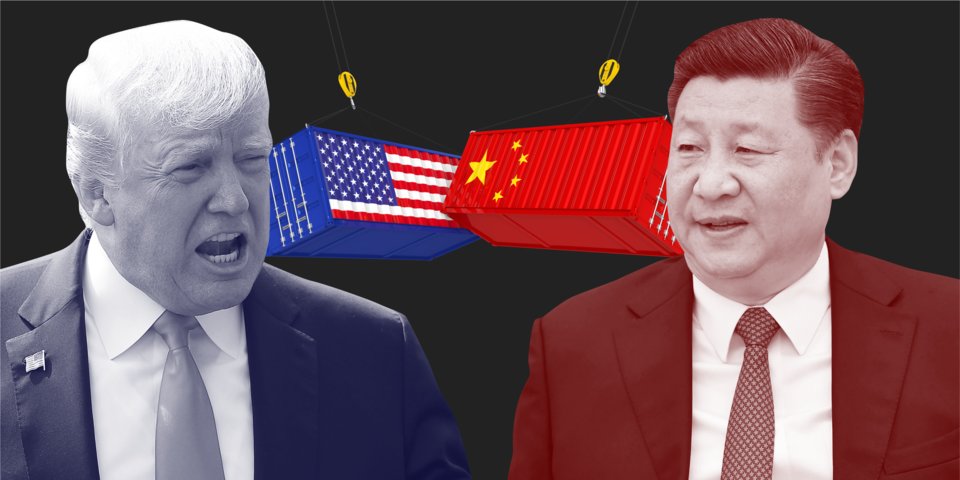 IMF Managing Director Christine Lagarde urged members at the meeting to "de-escalate" trade tensions and work on fixing global trade rules. She also warned against adding currency to the trade conflict, saying this would hurt global growth as well as "innocent bystander" nations, including emerging markets that supply commodities to China.
IMF Managing Director Christine Lagarde urged members at the meeting to "de-escalate" trade tensions and work on fixing global trade rules. She also warned against adding currency to the trade conflict, saying this would hurt global growth as well as "innocent bystander" nations, including emerging markets that supply commodities to China.
Egyptian Finance Minister Mohamed Maait said policy makers in developed countries should understand that if their actions hurt other countries it would have knock-on effects.
"You need me. I am a market for you, I am an opportunity for you," Maait told Reuters. "I don't believe there will be a winner and a loser. Either all are winners or all are losers."
Indeed, market ructions have now cascaded through to developed markets with Wall Street seeing a six session slide until a rebound on Friday, amid fears over the trade war between China and the United States.
However, other than having effective monetary policies, developing markets can do little to cope with the impact of rate hikes and trade battles, said Jacob Frenkel, chairman of JPMorgan Chase International.
"When elephants fight, the grass suffers."
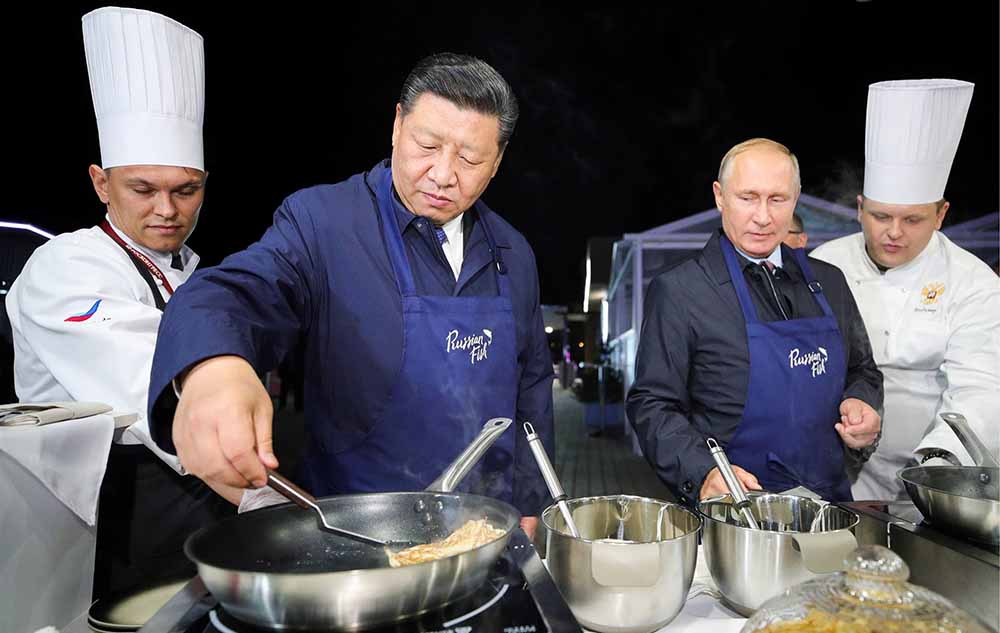
Russia, China embrace uneasily, aim for 'desirable world order'
Donning a blue apron, Russian President Vladimir Putin poured batter into a pan and tossed it.
He was cooking with his Chinese counterpart, Xi Jinping, and the pair were making a traditional Russian pancake called a blini.
The culinary showmanship reflected a larger trend: Russia and China are developing a closer, albeit uneasy friendship.
Before last week's blini-making, the two leaders had just discussed military and economic cooperation on the sidelines of the Eastern Economic Forum, an annual event held in this far-eastern Russian city.
"The president and I agree that since the beginning of this year, Russian-Chinese relations have been showing dynamic growth," Xi said. He announced that ties with his "close friend" Putin had "entered a new era of rapid development and are reaching a higher level."
It was the third Xi-Putin meeting in four months, and the first time the Chinese president had attended the event in Vladivostok, which started in 2015 and encourages foreign investment.
Russian President Vladimir Putin, right, and Chinese President Xi Jinping attend the Eastern Economic Forum in Vladivostok, Russia, on Sept. 12Valery Sharifulin / AP
The growing rapport between the two countries has accelerated under President Donald Trump, whose policies have put greater pressure on both countries, according to Alexander Gabuev, a senior fellow at the Carnegie Moscow Center.
Ties between the countries have been strengthening for a while, but the "Trump administration and domestic political fight in the U.S. just brings confrontation to a new level, and increased Sino-Russian cooperation is [the] result,” he said.
Russia and China’s increased cooperation is “driven by U.S. pressure against both of them at the same time,” Gabuev said.
The latest evidence of this pressure came on Monday when the Trump administration announced a new round of tariffs on China, slapping a 10 percent tax on a $200 billion list of Chinese imports ranging from consumer goods to manufacturing materials. The move marked an escalation in ongoing Beijing-Washington. trade tensions that began over the summer when the administration imposed a 25 percent tariff on steel and aluminum from China, the world's second-largest economy.
In Russia, sanctions are continuing to bite after they were imposed by Trump's predecessor, President Barack Obama, over Moscow's invasion of Ukraine, and under the current administration over meddling in the 2016 U.S. presidential election and for using a chemical weapon against an ex-spy in Britain.
Meanwhile, trade between Russia and China reached $87 billion in 2017, up from $64.2 billion in 2015. Putin said in Vladivostok that this figure is expected to top $100 billion for 2018, and that both sides want to increase the use of their national currencies in lieu of the U.S.dollar.
Both Xi and Putin took the opportunity in Vladivostok to criticize protectionism, comments widely interpreted as an oblique reference to Trump's policies.
"Putin and Xi are on the same page when it comes to the fundamental concept of a desirable world order," Dmitri Trenin, the director of the Carnegie Moscow Center think tank, wrote in an opinion piece in China Daily, a Chinese state-run newspaper.
Their shared ideals include "several independent power centers instead of a single-nation hegemony; protection of state sovereignty from foreign political and ideological influence; and full equality among peers, including the United States," he wrote last week.
China and Russia, however, are far from jumping into a formal alliance.
China has greater bargaining power and is not willing or able to compensate Russia's economic loses due to Western sanctions, Zach Witlin, an analyst at Eurasia Group, told NBC News. China generally takes a view that Russia's geopolitical problems are its own to deal with, he added.
"All of this is balanced against the fact that Russia and China have limits to what they are willing to cooperate on and how deeply that cooperation is likely to develop," he said.
Notably, although Xi and Putin generated plenty of buzz for their so-called pancake diplomacy, it was actually the second time this year that the two leaders were shown cooking together.
Both Xi and Putin took the opportunity in Vladivostok to criticize protectionism, comments widely interpreted as an oblique reference to Trump's policies.
"Putin and Xi are on the same page when it comes to the fundamental concept of a desirable world order," Dmitri Trenin, the director of the Carnegie Moscow Center think tank, wrote in an opinion piece in China Daily, a Chinese state-run newspaper.
Their shared ideals include "several independent power centers instead of a single-nation hegemony; protection of state sovereignty from foreign political and ideological influence; and full equality among peers, including the United States," he wrote last week.
China and Russia, however, are far from jumping into a formal alliance.
China has greater bargaining power and is not willing or able to compensate Russia's economic loses due to Western sanctions, Zach Witlin, an analyst at Eurasia Group, told NBC News. China generally takes a view that Russia's geopolitical problems are its own to deal with, he added.
"All of this is balanced against the fact that Russia and China have limits to what they are willing to cooperate on and how deeply that cooperation is likely to develop," he said.
Notably, although Xi and Putin generated plenty of buzz for their so-called pancake diplomacy, it was actually the second time this year that the two leaders were shown cooking together.

In June, the two leaders met in the Chinese city of Qingdao at the Shanghai Cooperation Organization, a political, economic and security alliance among Eurasian nations.
On the same weekend Trump was criticizing his allies at the Group of Seven leading industrial nations, Chinese state media released footage of Putin making several Chinese dishes, including "baozi," a type of filled bun, and a crepe-like dish called "jianbing," in nearby Tianjin.
It had been known as the Group of Eight before Russia was suspended in 2014 over its annexation of Crimea.
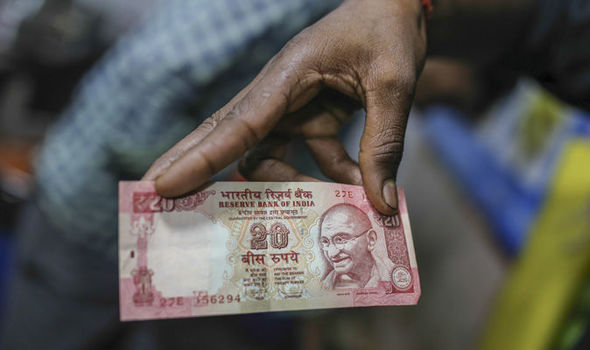
Asia's worst performing currency; Indian Rupee hits new all-time low of 73.77 against Dollar
The rupee crashed to a new all-time low of 73.77 against the US dollar on Thursday, reported news agency Press Trust of India (PTI).
The local currency dropped 44 paise against the US currency in the morning session as global oil prices continued to rise, deepening concerns about the current account deficit (CAD) and capital outflows. Consistent dollar demand from importers, mainly oil refiners also kept the rupee under pressure, traders said.
The Indian finance ministry announced last week that it was raising import tariffs on 19 items, coming into immediate effect. India imported close to USD 12 billion worth of these goods in the last financial year, it said.
Custom duties on fridges, and air conditioners, for example, have been doubled to 20 per cent, while aviation turbine fuel customs duty, which was previously not imposed, has been added at a rate of 5 per cent. Some plastic items and suitcases are also among the affected products. There are also expectations that there could be more steps to reduce imports.
New Delhi is hiking duties to try to support the Indian rupee, which has slumped to a series of record lows against the US dollar in recent weeks. It is Asia's worst performing currency this year, down about 13 per cent.
The state-owned oil marketing companies have also been allowed to raise USD 10 billion from overseas markets to meet their working capital needs.

Typhoon Mangkhut: South China battered by deadly storm
A powerful storm which killed dozens of people in the Philippines is now making its way across southern China.
Typhoon Mangkhut is one of the most powerful storms to hit the region in decades.
Two people have been killed in the Chinese province of Guangdong, according to state media - more than 2.5 million people have been evacuated in Guangdong and on Hainan island.
In Hong Kong, the storm wrecked buildings and shut down the city.
The typhoon is now moving inland, and is expected to hit the Chinese regions of Guizhou, Chongqing and Yunnan later in the day.
In the Philippines, 33 miners have been confirmed dead and at least 29 are missing after a landslide hit a mining site in Itogon in Benguet province, according to local reports.
Search and rescue missions are continuing, and there are fears the death toll could rise above 100, said Itogon's mayor, Victorio Palangdan.
In Hong Kong, which was hit hard over the weekend, videos on social media showed apartments swaying in the wind, scaffolding crashing to the ground and commercial buildings with windows shattered.
Transport services have also been suspended, with flights cancelled, trains stopped and major roads closed.
Mangkhut is expected to gradually weaken into a tropical depression by Tuesday as it continues to move inland.
Source : BBC

More Than 800 Confirmed Killed After Tsunami And Earthquake In Indonesia
The number of people confirmed killed after a tsunami and earthquake in Indonesia rose dramatically to 844 on Monday, Indonesian authorities said.
Officials warned that the number of people killed could even reach into the thousands as rescuers reach more affected areas.
A 7.5 magnitude earthquake triggered an unexpected tsunami in the Indonesian island of Sulawesi Friday, leaving hospitals and rescuers struggling to respond.
Most of the confirmed deaths are from the city of Palu. But rescuers worry that they could find more victims of the disaster in the Donggala region, which is closer to the epicenter of the earthquake.
Indonesian disaster agency spokesman Sutopo Purwo Nugroho said earlier that bodies of some victims were found trapped under the rubble of collapsed buildings, adding that hundreds more were injured and many were missing, according to Reuters.
Authorities said that "tens to hundreds" of people were by the ocean in the hard-hit city Palu for a beach festival when the tsunami struck on Friday just after 5:02 PM Western Indonesian Time.

Egypt arrests ex-President Mubarak's sons for embezzlement
The two sons of former Egyptian President Hosni Mubarak have been arrested for alleged stock market manipulation.
Alaa and Gamal Mubarak are accused of breaking stock market and central bank rules, state news agency Mena reported.
The case against them began in 2012, after their father was deposed the year before. The pair had been out on bail for the past three years.
The brothers - who deny any wrongdoing - will appear in court on 20 October.
The Cairo court also ordered the arrest of three others, and the defendants collectively face charges of embezzling 2bn Egyptian pound ($115m; £88m).
Both Alaa, 57, and Gamal, 54, are charged with embezzling at least 494m Egyptian pound after they decided to sell the National Bank of Egypt for profit.
Source : BBC

New Report Shows Sexual Abuse in Catholic Church Remains Unsolved - Cardinal
A new report on sexual abuse in the Catholic Church showed that the issue has not been resolved yet, Cardinal Reinhard Marx, the president of the German Bishops’ Conference, said Tuesday in a published statement.
"The study on 'Sexual abuse of minors by Catholic priests, deacons and male members of orders in the domain of the German Bishops’ Conference' makes it clear to us that the Catholic Church has by no means overcome the issue of dealing with the sexual abuse of minors.
The study takes a deep look into the past," the cardinal said.
The study by universities of Mannheim, Heidelberg, and Giessen (MHG) was officially presented earlier on Tuesday at a press conference at the fall full assembly of the German Bishops’ Conference. It looked at personal files and references from 27 dioceses in the period between 1946 and 2014. A total of 3,677 "children and juveniles" were found to have been abused by 1,670 clerics.
According to the research project summary, 62.8 percent of the victims were male, 34.9 percent were female. However, 2.3 percent of the cases were missing gender data.The report showed that 51.6 percent of those affected by the abuse was of up to 13 years maximum at the time when they first were subjected to molestation, while 25.8 percent were aged 14 and older.
The study found that multiple acts against one individual were more frequent than one-off episodes.
The Church took action regarding 33.9 percent of the people accused of sexual abuse, while there were no proceedings launched for 53 percent of the abusers. The information on possible penalties was missing on some of the cases.

Trump 'orders further China tariffs'
US President Donald Trump has instructed staff to move forward with the next round of tariffs on Chinese goods, US media have reported. The tariffs are expected to apply to about $200bn worth of imports from China, including electronic parts and consumer goods such as handbags.
It remains unclear when the new import taxes - which could be as high as 25% - will go into effect. Officials are reportedly still working on the final list of products.
President Trump ordered his staff to start preparing the tariffs this summer, escalating a dispute over what the US says are China's unfair trade practices, such as state subsidies. The new duties would add to tariffs the US has already imposed on $50bn in Chinese goods as part of that dispute, as well as tariffs that China levied on $50bn in US goods in retaliation.
Friday's news reports that Trump has ordered the US to proceed with further tariffs quoted administration sources. There has so far been no formal announcement.
Source : BBC
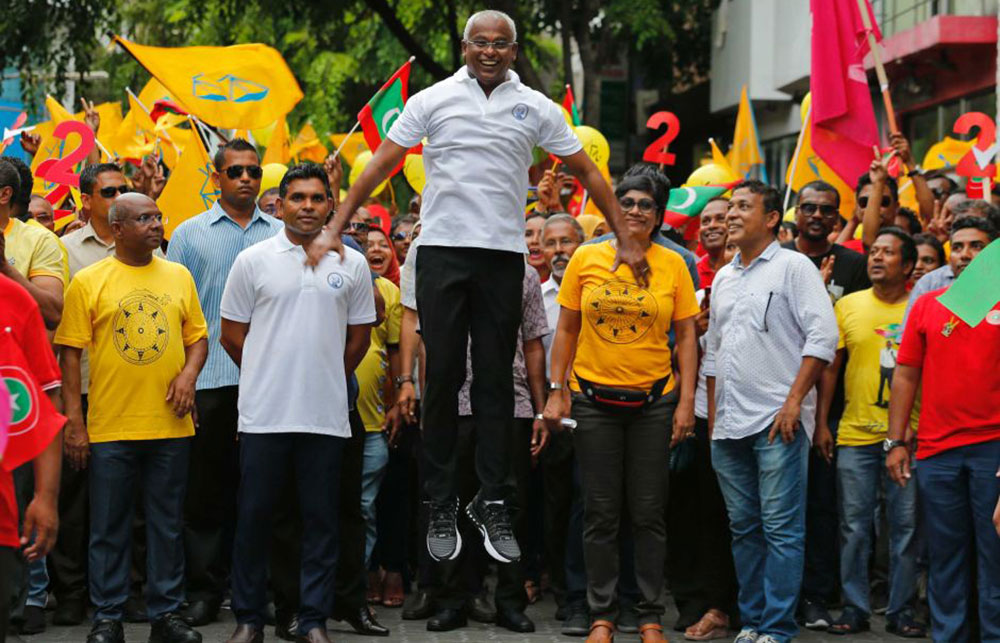
Maldives election: Opposition defeats China-backed Abdulla Yameen
Opposition candidate Ibrahim Mohamed Solih has won the Maldives' presidential election in a surprise defeat of President Abdulla Yameen.
He took 134,616 votes to beat Mr Yameen, who received 96,132, provisional results showed.
Mr Yameen, who has been accused of crushing dissent in the archipelago, admitted defeat, saying he accepted the result.
The Maldives is a key battleground in the rivalry between China and India. The US and India have welcomed Mr Solih's win. Mr Yameen had drawn the Maldives closer to China, which has stepped up its presence in the Indian Ocean in recent years.
Many opposition politicians in the Maldives have been jailed under Mr Yameen, and the US and European Union had threatened sanctions before the vote if the democratic situation did not improve.
Supporters of Mr Solih took to the streets in celebration overnight. "The message is loud and clear. The people of Maldives want change, peace and justice," Mr Solih, widely known as Ibu, told reporters in the capital, Male. In a televised address to the nation on Monday, Mr Yameen said he had congratulated Mr Solih, while defending his record.
President Yameen had been widely expected to win another term in office and some observers had believed the election was rigged in his favour. Voter turnout was 89%,"No major issues were reported in the vote counting process as well as with the voters list, which will affect the results," the foreign ministry said in a statement.
Source : BBC

Japan hit by deadly earthquake and mudslides
Japan's northern island of Hokkaido has been hit by a powerful earthquake, triggering landslides that engulfed houses.
At least eight people have been killed and about 40 are missing, say local media reports.
The magnitude 6.7 quake cut power to around three million homes after a thermal power plant was damaged.The earthquake comes on the heels of a deadly typhoon lashing the west of Japan over the past few days.
Jebi, the strongest typhoon to hit the country in 25 years, killed at least 10 people and caused widespread damage and disruption. The tremor struck 62km (39 miles) south-east of the regional capital Sapporo in the early hours of the morning.
It posed no tsunami risk, the country's meteorological agency said. A nuclear plant - which was not operational - had to switch to its back-up power supply to keep spent fuel cool. Local residents and travellers in the region have shared their shock about the quake on social media.They also write about long lines at food stores as people stock up on supplies amid fears of more tremors.
Source : BBC
Page 27 of 51
